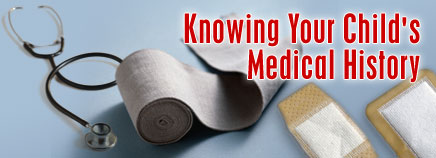
When providing emergency care, doctors, nurses, and emergency personnel like paramedics will have many questions about a patient’s medical history. And even the most organized parent might not be able to remember the details of a child’s health history in a stressful situation.
That’s why it’s important to keep a comprehensive record of your kids’ health information nearby. In many cases, this information can help a medical professional make quicker diagnoses and decisions during an emergency, when each second counts.
Some hospitals have computerized medical records that keep all medical information about a patient in one place. So when you get to the hospital, everything about your child’s history will be available. But it’s still a good idea to update your family’s records because something like a medication may have changed since the last visit.
Keeping Track of Medical Information
Refer to the categories below to create a complete health record for your kids; if applicable, also use the hospital’s computerized record.
Keep one copy of the record in an accessible place at home (such as on the refrigerator) or by the phone, one in each car, one at each parent’s workplace, and one in each parent’s bag or wallet. Also send a copy to your kids’ schools or childcare, and give one to any regular caregivers, along with the name and number of your doctor.
Allergies
Record on your list any known allergies your child has to medications, both prescription and nonprescription, and any known allergic reactions to insect stings and bites and food allergies. In addition, some kids may have latex allergies. In many cases, allergy information helps medical personnel discover a cause for problems like swelling or difficulty breathing.
Medications
Certain medications can’t be taken together, so paramedics need to know all medications (prescription and nonprescription) your kids take before they can administer certain drugs.
A child’s symptoms also could be due to side effects of medications, which is another reason it’s important to report everything being taken. In addition, you need to know the doses, the dosing schedules, and when and how much of the medications were recently taken.
Pre-existing Illnesses or Conditions
Pre-existing illnesses or conditions can have a great impact on the kinds of tests or treatments administered during an emergency. If your child has any health problem — from diabetes to epilepsy to asthma — emergency medical personnel must know. For additional protection, kids with chronic conditions (long term) should wear an identifying bracelet with this important information on it. This kind of immediate notification can help doctors save a child’s life.
For a child with special needs, you and your doctor can fill out a form created by the American Academy of Pediatrics (AAP) and the American College of Emergency Physicians (ACEP). The Emergency Information Form (EIF) for Children With Special Needs can be found at either aap.org or acep.org and can be updated as needed.
As with any other health record you create, keep the form in an easily accessed place at home.
Hospitalizations and Operations
List the dates your child has been hospitalized, the reasons for hospitalization, treatments received, and the types of operations performed. This information may help during and following an emergency situation.
Immunizations
Keeping an updated record of all your kids’ immunizations is important. If you need help remembering or compiling this, the staff at your doctor’s office can assist you. Be sure to include information about any reactions to an immunization, such as seizures, high fever, or severe discomfort.
Height and Weight
When calculating medication doses, it’s very helpful for doctors to know a child’s approximate height and weight. (Be sure to to keep this updated, since kids can grow quickly.)
It’s relatively easy to compile your child’s medical history, and it could mean saving critical minutes — when they count most!

